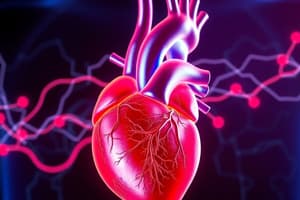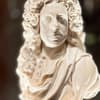Podcast
Questions and Answers
What is the primary purpose of the right side of the heart?
What is the primary purpose of the right side of the heart?
- Pumps deoxygenated blood to the lungs (correct)
- Receives blood from the lungs
- Pumps oxygenated blood to the brain
- Pumps oxygenated blood to the extremities
Which condition is indicated by low O2 readings on arterial blood gases (ABGs)?
Which condition is indicated by low O2 readings on arterial blood gases (ABGs)?
- Pneumothorax
- Hyperventilation
- Asthma attacks
- Obstructive lung conditions (correct)
What happens to blood in the lungs during gas exchange?
What happens to blood in the lungs during gas exchange?
- It gains oxygen and loses carbon dioxide (correct)
- It circulates back to the right side of the heart
- It loses oxygen and gains carbon dioxide
- It remains unchanged
What is a common visual indicator of low oxygen saturation?
What is a common visual indicator of low oxygen saturation?
What is indicated by elevated CO2 readings on arterial blood gases?
What is indicated by elevated CO2 readings on arterial blood gases?
What condition is typically associated with hyperinflation on a chest X-ray?
What condition is typically associated with hyperinflation on a chest X-ray?
Which of the following describes low lung volumes on a chest X-ray?
Which of the following describes low lung volumes on a chest X-ray?
What phase does deoxygenated blood undergo before returning to the left side of the heart?
What phase does deoxygenated blood undergo before returning to the left side of the heart?
What is the primary function of the heart?
What is the primary function of the heart?
Which chamber of the heart receives deoxygenated blood?
Which chamber of the heart receives deoxygenated blood?
How many lobes does the right lung have?
How many lobes does the right lung have?
What is the role of the left ventricle?
What is the role of the left ventricle?
What is the primary function of the lungs?
What is the primary function of the lungs?
Which structure divides the trachea into two main bronchi?
Which structure divides the trachea into two main bronchi?
Which of the following is true regarding the heart's chambers?
Which of the following is true regarding the heart's chambers?
Why does the left lung have fewer lobes than the right lung?
Why does the left lung have fewer lobes than the right lung?
What is the primary function of the left ventricle?
What is the primary function of the left ventricle?
Which valve is located between the left atrium and the left ventricle?
Which valve is located between the left atrium and the left ventricle?
What is the role of the pulmonary loop in the circulatory system?
What is the role of the pulmonary loop in the circulatory system?
What structure surrounds each lung and helps reduce friction during breathing?
What structure surrounds each lung and helps reduce friction during breathing?
Where does gas exchange take place within the lungs?
Where does gas exchange take place within the lungs?
What is the main purpose of valves in the heart?
What is the main purpose of valves in the heart?
What is the systemic loop responsible for?
What is the systemic loop responsible for?
What does the circulatory system ensure in terms of gas exchange?
What does the circulatory system ensure in terms of gas exchange?
Which symptom may indicate a compromised respiratory function?
Which symptom may indicate a compromised respiratory function?
How does a history of smoking impact health in relation to respiratory conditions?
How does a history of smoking impact health in relation to respiratory conditions?
What physical assessment finding indicates possible lung congestion?
What physical assessment finding indicates possible lung congestion?
Which of the following could indicate reduced independence in daily living activities?
Which of the following could indicate reduced independence in daily living activities?
What would likely be seen on an X-ray indicating pulmonary issues?
What would likely be seen on an X-ray indicating pulmonary issues?
Which symptom indicates that a patient may be struggling to clear secretions effectively?
Which symptom indicates that a patient may be struggling to clear secretions effectively?
What condition is characterized by confusion and dizziness?
What condition is characterized by confusion and dizziness?
Which of the following can indicate the presence of atelectasis?
Which of the following can indicate the presence of atelectasis?
What is a common sign of reduced exercise capacity in patients?
What is a common sign of reduced exercise capacity in patients?
Which symptom can occur due to mobility impairment?
Which symptom can occur due to mobility impairment?
What might a patient with confused mental status and shortness of breath be experiencing?
What might a patient with confused mental status and shortness of breath be experiencing?
Which might indicate a need for further assessment in a patient with a moist cough?
Which might indicate a need for further assessment in a patient with a moist cough?
Which symptom can be a result of fatigue beyond baseline activity in patients?
Which symptom can be a result of fatigue beyond baseline activity in patients?
Flashcards are hidden until you start studying
Study Notes
Heart Structure and Function
- Acts as a pump to circulate blood throughout the body.
- Comprises four chambers: two atria (upper) and two ventricles (lower).
- Right atrium receives deoxygenated blood and sends it to the right ventricle.
- Right ventricle pumps blood to the lungs for oxygenation.
- Left atrium collects oxygenated blood from the lungs, transferring it to the left ventricle.
- Left ventricle pumps oxygenated blood throughout the body.
Heart Valves
- Contains four key valves: tricuspid, pulmonary, mitral, and aortic.
- Valves ensure unidirectional blood flow between chambers and out of the heart.
Circulatory Loops
- The pulmonary loop moves deoxygenated blood from the right side of the heart to the lungs and back.
- The systemic loop delivers oxygenated blood from the left side of the heart to the rest of the body.
Lung Structure and Function
- Lungs are spongy organs located in the thoracic cavity, with one on each side of the heart.
- Key function is gas exchange, facilitating oxygen intake and carbon dioxide removal.
- Right lung consists of three lobes (superior, middle, inferior); left lung has two lobes (superior, inferior), accommodating the heart.
Lung Anatomy
- The trachea branches into two main bronchi, each entering the lungs and subdividing into smaller bronchioles.
- Tiny air sacs called alveoli are the sites for gas exchange.
- Each lung is encased by the pleura, a double-layered membrane providing lubrication and reducing friction during breathing.
Relationship Between Heart and Lungs
- Heart and lungs work together to oxygenate blood and eliminate carbon dioxide.
- The right side of the heart pumps deoxygenated blood to the lungs for oxygen uptake.
- Oxygenated blood returns to the left side of the heart to be circulated throughout the body.
Cardiorespiratory Impairments: O2 Movement
- Low oxygen levels can be evidenced by low readings on arterial blood gases (ABGs) or pulse oximetry.
- Chest X-rays may reveal low lung volumes indicating underinflation.
- Cyanosis may appear as blue discoloration of lips and fingertips.
- Symptoms can include dizziness, confusion, fatigue, and shortness of breath, with abnormal auscultation findings like reduced breath sounds.
Cardiorespiratory Impairments: CO2 Movement
- Difficulty in exhaling can indicate obstructive conditions, reflected by high CO2 levels in ABGs.
- Use of accessory muscles may increase, and pursed-lip breathing can be employed to expel excess CO2.
- Consequences include reduced exercise capacity and impact on daily activities.
Secretion Clearance Impairments
- An ineffective or moist cough can hinder proper secretion clearance from the lungs.
- Conditions like cystic fibrosis, bronchiectasis, and pneumonia can complicate secretion management.
- May present with abnormal X-ray findings (consolidation) and increased fatigue or shortness of breath.
Mobility Impairments
- Mobility can decline from baseline, with limitations due to weight-bearing status and increased periods of bed rest contributing to deconditioning.
- Some individuals may require assistance with activities of daily living (ADLs) and may experience reduced exercise tolerance.
Studying That Suits You
Use AI to generate personalized quizzes and flashcards to suit your learning preferences.




